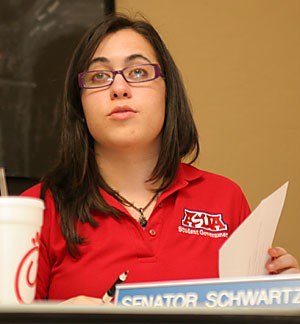The Associated Students of the University of Arizona unanimously passed a resolution opposing the dean of students’ new red-tag policy at last night’s senate meeting.
The resolution, titled “”A Resolution in Opposition to the Red-Tag Pilot Program,”” was sponsored by new ASUA Sen. Brad Burns.
Burns was appointed senator last week to replace former senator Mark Adams, who recently transferred schools.
The resolution states that the UA student government, and therefore the UA student body, is opposed to the new red-tag policy enacted by the dean of students in January.
It also calls for the dean of students to abolish the program after it is reviewed in the spring.
“”The red- tag program is unacceptable, and we need to move on from here,”” Burns said.
The resolution will serve as the official position of UA’s student government as well as the student body.
The new Dean of Students red-tag policy states that UA students who receive a red tag off campus may now be punished by the university as well as by police departments.
Through the current red-tag policy, the Dean of Students receives a weekly report of red-tags violators from the TPD and then determines which reports involve UA students.
Several red tag reports have already been turned over to the dean of students, one involving a UA student.
“”The civil punishments by the TPD are fairly severe already for hosting unruly gathering,”” Burns said. “”UA students do not need to be punished twice.””
Sen. Bryan Hill, an economics senior who also opposed the dean of students’ red-tag policy, said the policy “”definitely blurs the line of privacy.””
“”Why only red tags?”” Hillsaid. “”What about spitting on the sidewalk?””
The passing of this resolution does not mean that the new red-tag policy is no longer valid. It does, however, signify that ASUA is opposed to it and members are ready to do something about it.
Senators agreed that further action will be taken by ASUA to ensure cooperation and negotiation with the dean of students in this matter.
Burns also added that the resolution is a way to start more dialogue and negotiations between ASUA and the dean of students.
“”This is groundwork for ASUA to speak on behalf of the student body,”” Burns said.
ASUA has no alternative red-tag plan currently and will discuss possibilities in the future weeks. However, David Reece, executive vice president of ASUA and a history junior, said he thinks the majority of senators would like no plan at all.
The technology surveys that have been sent out via e-mail this week have received more feedback than any other UA survey, said ASUA Sen. Steven Gerner, a political science senior.
In the survey, students are asked to rank their priorities of where they think the technology fee money should go.
The reports are sent to the Information Technology Student Advisory Board, which then decides if the technology fee should be increased and where all of the money should be spent.
Senators also voted to approve the consent agenda for UA club funding.
While most amounts were approved, there was some disagreement on whether or not the Anatomy Enthusiasts Society (AES) should receive $4,052.50 for the purchase of two cadavers, dead bodies intended for dissection.
The new UA club is aiming to help undergraduate students, who are mostly pre-medical, gain knowledge and exposure to anatomical dissections through cadaver use.
There was mixed opinion on whether the amount should be approved.
The cadaver item was voted to go back to the Appropriations Board for more revision.









